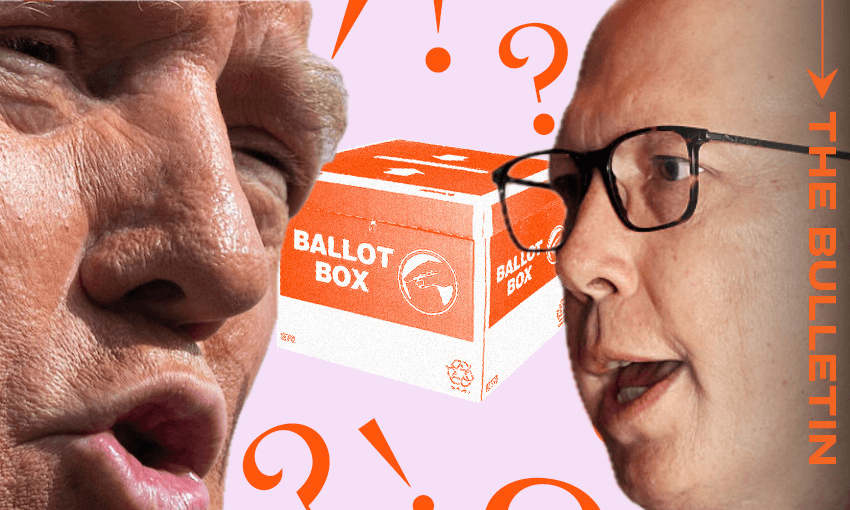Australia’s election result shows the limits of culture-war campaigning and the power of the political centre – with lessons for both National and Labour, writes Catherine McGregor in today’s extract from The Bulletin.
To receive The Bulletin in full each weekday, sign up here.
The Trump effect – and its limits
If New Zealand’s right-wing parties are tempted to borrow too heavily from the Trump playbook, the result of Australia’s election this weekend offers a cautionary tale. Prime minister Anthony Albanese swept back into power after Coalition leader Peter Dutton’s campaign, which leaned into anti-woke rhetoric and admiration for Trump, backfired dramatically. The effect wasn’t limited to Australia. In Canada’s election a fortnight ago, a similar MAGA-friendly strategy cost the Conservatives’ Pierre Poilievre a lead he’d held for months.
These failures suggest that closely aligning with Trump-style politics may energise a noisy minority, but alienates the broader electorate. Speaking to Newstalk ZB’s Francesca Rudkin, former National minister Steven Joyce said that in both elections, “the middle has asserted itself and said, right, this is broadly what we want, and this is the crowd we think are going to be best suiting us at this time”.
The centre holds
A clear centre-focused strategy proved to be a winning formula for Anthony Albanese. His campaign pivoted away from ideological issues like the Indigenous Voice referendum and instead foregrounded mainstream concerns like public health, tax cuts and the cost of living. The result was a historic landslide.
For some politics-watchers back home, the Australian result is evidence that electoral success lies in persuading swing voters, not in rallying the far ends of the base. It showed that “the centre’s absolutely up for grabs,” Labour leader Chris Hipkins told Politik’s Richard Harman on Sunday (paywalled). “The austerity politics that Nicola Willis is promoting, the fact that Christopher Luxon’s indulging David Seymour and Act in their populist divisive politics – I think people look at the government and say we’re not sure that this is what we voted for.”
For Luke Malpass in The Post (paywalled), the lesson for Labour is a bit different: “The only way to get re-elected is focusing on what actually matters to people; not what you think should matter to them.”
Structural differences, but shared lessons
Political scientist Jennifer Curtin, writing in The Post, says left-leaning parties’ hopes of making it a Canada-Australia-NZ hat-trick “may be premature”, given the key role played by Australia’s unique electoral system in Labor’s win. Provisional results show Labor won around 34% of the primary vote, compared to 31% for the Coalition parties, Curtin writes. “Smaller parties and independents also won a third of the primary vote, but their preferences [ie the parties they put in 2nd or 3rd place] appear to have benefited Labor.”
Another difference: Australians are experiencing the effects of the Trump tornado more acutely than New Zealanders, according to Harman, who says the “impact of the post-tariff slump in the share market has been much more universally felt” there due to the ubiquity of superannuation share portfolios. But the broader lesson holds. “There would seem to be no market for Trumpism or any other extremism down under,” Harman writes. Amid global instability and American-made economic headwinds, voters appear to be favouring competence over confrontation.
Tariff clouds gather for NZ’s screen industry
Meanwhile, Trump’s declaration of a 100% tariff on all films “produced in foreign lands” on Monday has sent shockwaves through New Zealand’s $3.5 billion screen industry, which relies heavily on American productions. When asked about it, the PM struck a cautious note, saying it was “way too soon” to speculate on policy changes. Speaking to The Spinoff’s Alex Casey, screen veteran John Barnett was blunter: “Not unlike everything else Trump has done, it is totally lacking in logic.”
Still, the potential fallout is serious. As Barnett points out, “Right now US productions are the biggest source of continual [screen] production in New Zealand,” with local jobs, post-production houses and regional economies all at stake. For now, the industry can only hold tight and hope Trump changes his mind, Barnett says. “If there’s one thing we’ve learned in the first 100 days, it’s that what he says today isn’t necessarily what he’ll say tomorrow.”

